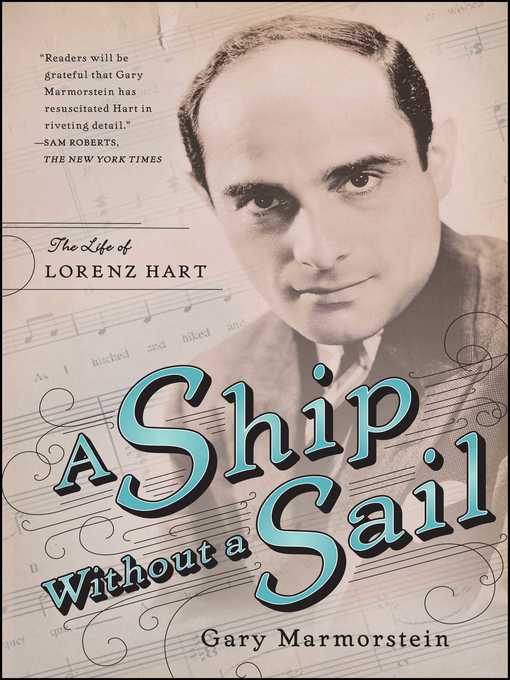
A Ship Without a Sail
The Life of Lorenz Hart
کتاب های مرتبط
- اطلاعات
- نقد و بررسی
- دیدگاه کاربران
نقد و بررسی

Starred review from May 7, 2012
The lyricist who, with composer Richard Rodgers, penned “Blue Moon,” “The Lady Is a Tramp,” and other standards is a figure worthy of his own bittersweet songs in this graceful biography. A squat gay man who lived with his mother and had the kind of “laughable... unphotographable” looks he toasted in “My Funny Valentine,” Hart is a jaunty, cigar-chomping bon vivant with a secretly wounded soul, an extraordinary poetic facility—his greatest verses seem to have been dashed off on half an hour’s deadline—and a ruinous thirst for booze. Journalist Marmorstein (Hollywood Rhapsody) resists the temptation to psychoanalyze and instead explores Hart’s personality mainly through shrewd readings of his lyrics as they veer between “enthralling new romance and a lonely, unforgiving desolation.” He holds to a middle-distance perspective, organizing the narrative around lively accounts of Rodgers and Hart’s Broadway and Hollywood musical projects, with Hart’s self-destructive excesses surfacing in matter-of-fact vignettes amid the showbiz swirl. Along the way, he paints a vivid panorama of pre-WWII musical theater and the efflorescence of Jewish-American tune- and word-smithing that created it. Marmorstein’s take on his subject’s life feels like a Rodgers and Hart show, nicely balanced between exhilarating spectacle and pithy revelations of character. Agent, Dan Conaway, Writers House.

Starred review from May 15, 2012
The author of The Label: The Story of Columbia Records (2007) returns with a deeply sympathetic biography of Lorenz Hart (1895-1943), the talented, troubled lyricist of film and Broadway fame. Marmorstein, who has published often about the popular arts, has done an enormous service for fans of stage and movie musicals of the early decades of the 20th century. Here, the author details Hart's short life, explores his most productive professional partnership with composer Richard Rodgers, chronicles his descent into the alcoholism that killed him, speculates about his sexuality (his colleagues knew he was gay; the public did not), and provides numerous examples of Hart's witty, sometimes risque lyrics (risque, of course, by 1940s standards). Hart, whose adult height perhaps touched 5 feet and who seemed always to have a cigar, wrote some 800 songs with Rodgers, many of which are Broadway classics, among them "Manhattan," "My Funny Valentine" and "Where or When." But Hart was a psychological mess. Perhaps due to his height (a constant joke about him in the press, and even from Rodgers' mouth) or his sexuality (frequently he would disappear in the evenings) or the enormous pressure to write on quick deadlines, Hart became so increasingly unreliable that Rodgers approached Oscar Hammerstein II to write the lyrics for the show that would become Oklahoma! Hart subsequently wrote only a handful of songs. Marmorstein often summarizes the shows of Rodgers and Hart (routinely referring to them as "the boys"), sometimes too thoroughly, and there are so many interesting characters on his stage--like Cole Porter and George Abbott--that occasionally he loses track of Hart, who, sadly, left few intimate documents, excepting, of course, those wondrous words. "Ev'rything I've got belongs to you," goes one Hart lyric that now, thanks to the author's thorough, affectionate research, holds another, profoundly poignant meaning.
COPYRIGHT(2012) Kirkus Reviews, ALL RIGHTS RESERVED.

February 15, 2012
Imagine a world without "Blue Moon" or "My Funny Valentine." Not possible, and arts journalist Marmorstein (Hollywood Rhapsody) gives a full-scale account of the lyricist, infusing his text with plenty of Hart's own magical words.
Copyright 2012 Library Journal, LLC Used with permission.

June 1, 2012
The Great American Songbook would have been much less great without the works of Lorenz Hart and his partner, Richard Rodgers. I Could Write a Book, Where or When, and My Funny Valentine are just a few of the songs that continue to be the music of our lives. Hart's lyrics, notable for their internal rhymes and sophisticated wit, also reflected the longing that suffused the writer's life. Shortalmost dwarfish in appearancean alcoholic, and homosexual, Hart wrote songs that appealed to everyone who has ever lost at love or never had a chance at all. Marmorstein starts off with a bang: Hart's brother is seemingly being cheated out of his inheritance by Rodgers. But after an initial look at Hart's early years, the biography becomes more about long-ago shows and long-forgotten theater folk than Hart himself. The exhaustive detail about which show opened when slows the book down. Yet when the narrative does go back to Hart's struggles or the troubled relationship between Rodgers and Hart, it brings a new dimension to so many familiar songs.(Reprinted with permission of Booklist, copyright 2012, American Library Association.)

























دیدگاه کاربران